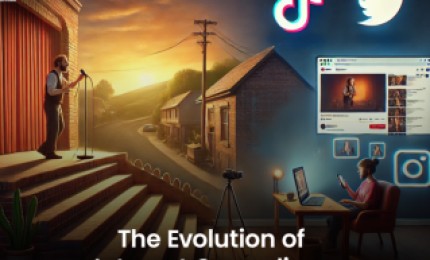Technological advancements are reshaping industries globally, and the entertainment sector is no exception. This article explores the pivotal role of AI in revolutionizing the entertainment landscape. The integration of AI brings a multitude of benefits, promising to enhance how content is produced, shared, and enjoyed. Read on to discover why embracing AI is crucial for the success of the media and entertainment industries.
In today's rapidly evolving digital world, adopting cutting-edge technologies is essential for staying competitive. AI stands out as a transformative force in the entertainment industry, driven by the audience's growing demand for more personalized and engaging experiences.
The primary advantage of AI in entertainment and media is its capability to process and analyze vast datasets effectively. This data-centric approach enhances decision-making across various facets, from content creation to marketing tactics and audience engagement. AI algorithms not only forecast trends and consumer preferences with remarkable precision but also enable the execution of targeted and potent promotional strategies, significantly enhancing outcomes.
Furthermore, AI-driven automation optimizes operational efficiencies and cuts down costs, allowing businesses to allocate more resources towards innovation and creative endeavors. Whether it's production companies looking to improve viewer experiences or boost revenues, the impact of AI in the entertainment industry is truly transformative and revolutionary.
Artificial Intelligence (AI) is revolutionizing the media and entertainment industries, reshaping content production, distribution, and audience engagement in profound ways. This technology, particularly through content recommendation algorithms, has significantly enhanced user experiences on platforms like Netflix and Spotify. By analyzing viewer preferences and behaviors, AI facilitates personalized content recommendations, improving satisfaction and bolstering user retention.
Furthermore, AI is transforming content automation. Advanced technologies such as deep learning have facilitated the development of voice synthesis for virtual reality, dubbing, localization, and even the creation of AI-generated music and narratives. These innovations not only reduce production costs but also spawn new avenues for creative expression.
AI's influence extends to gaming, where it's used for behavior modeling, systemic content generation, and facilitating complex adaptive processes. These capabilities deliver more immersive and dynamic gaming experiences. Additionally, AI-powered virtual assistants and chatbots are enhancing customer support and engagement across various digital entertainment platforms.
Beyond creative enhancements, AI is pivotal in advancing content protection and copyright enforcement. It plays a crucial role in developing sophisticated anti-piracy measures and maintaining a secure digital environment, thus safeguarding intellectual property rights.
Overall, the integration of AI in the entertainment sector is not just a technological upgrade but a comprehensive enhancement of how content is created, delivered, and protected. Companies looking to leverage AI in entertainment can greatly benefit from partnering with specialized Artificial Intelligence Development Companies to harness these advancements effectively.
Artificial intelligence (AI) is revolutionizing the media and entertainment industries, reshaping content production, distribution, and audience engagement in profound ways. This technology, particularly through content recommendation algorithms, has significantly enhanced user experiences on platforms like Netflix andSpotify.By analyzing viewer preferences and behaviors, AI facilitates personalized content recommendations, improving satisfaction and bolstering user retention.
Furthermore, AI is transforming content automation. Advanced technologies such as deep learning have facilitated the development of voice synthesis for virtual reality, dubbing, localization, and even the creation of AI-generated music and narratives. These innovations not only reduce production costs but also spawn new avenues for creative expression.
AI's influence extends to gaming, where it's used for behavior modeling, systemic content generation, and facilitating complex adaptive processes. These capabilities deliver more immersive and dynamic gaming experiences. Additionally, AI-powered virtual assistants and chatbots are enhancing customer support and engagement across various digital entertainment platforms.
Beyond creative enhancements, AI is pivotal in advancing content protection and copyright enforcement. It plays a crucial role in developing sophisticated anti-piracy measures and maintaining a secure digital environment, thus safeguarding intellectual property rights.
Overall, the integration of AI in the entertainment sector is not just a technological upgrade but a comprehensive enhancement of how content is created, delivered, and protected. Companies looking to leverage AI in entertainment can greatly benefit from partnering with specialized artificial Intelligence Development Companies to harness these advancements effectively.
AI algorithms are transforming the landscape of creativity and diversity in various industries by harnessing their ability to analyze vast volumes of data. These algorithms can identify trends, statistical curves, and patterns in consumer behavior, serving as essential tools for forecasting and strategic planning. For example, AI-driven technologies can now generate music, artwork, and text automatically, enhancing user creativity and speeding up the conceptualization process.
AI also simplifies operations by automating routine tasks, addressing complaints efficiently, and streamlining discovery processes. This automation leads to lower costs, increased productivity, and greater flexibility compared to traditional mass production methods. AI's capabilities extend to detecting fine visual details necessary for automated processes like filtering, audio enhancement, and visual effects correction.
Furthermore, AI-assisted content creation supports experimental approaches such as trial-and-error in game character development and narrative crafting. This allows creators to explore innovative designs and unique storytelling techniques. The adoption of AI-generated content by the entertainment industry offers a competitive edge, helping businesses stand out and thrive in a crowded market.
The entertainment industry has undergone significant transformations, especially with the advent of AI-powered personalized recommendation systems. These systems enhance user experience and engagement dramatically by utilizing machine learning algorithms. These algorithms analyze user behaviors—such as searching, watching, and liking—to curate content that aligns with individual preferences across various platforms, including video streaming services, music apps, and gaming portals.
AI algorithms do more than just sift through content; they also provide tailored recommendations for movies, series, and games, and even customize advertisements to individual tastes. This personalized approach not only boosts user satisfaction but also increases the duration of engagement with the platform and strengthens customer loyalty.
Furthermore, AI recommendation systems are continuously evolving based on user interactions, ensuring that they adapt over time. The dynamic nature of these platforms means that they are always learning and improving, providing users with the most relevant and up-to-date content suggestions. This ongoing learning process ensures that recommendations are based on meticulous analysis, keeping the content fresh and engaging for users.
AI technology is revolutionizing the entertainment industry by enhancing efficiency and reducing costs through the automation of various processes. Initially, AI's impact is most evident in how it transforms content production. By analyzing vast amounts of data, AI algorithms can accurately gauge audience preferences and trends, streamlining the content creation process to directly cater to target demographics. This method significantly reduces the reliance on the traditional trial-and-error approach, saving considerable time and resources in content development.
AI's role extends beyond content planning to practical applications in video editing, effects rendering, and other post-production tasks. These processes, traditionally requiring extensive manual effort, are now being automated with AI, resulting in reduced production downtime and lower costs. AI enhances productivity by automating repetitive tasks, allowing creative teams to focus more on innovation and less on routine work.
Moreover, AI-driven data analytics are crucial for refining marketing and distribution strategies. By evaluating audience behavior and engagement metrics, AI empowers entertainment companies to optimize their marketing campaigns, precisely target specific audience segments, and maximize their return on investment (ROI). This data-centric approach not only curtails expenses but also elevates the effectiveness and quality of marketing initiatives, ensuring that promotional efforts are both strategic and impactful.
AI significantly enhances user engagement in the entertainment industry by offering personalized recommendations. By analyzing data like user preferences, viewing habits, and interaction patterns, AI algorithms tailor recommendations for movies, shows, music, and other entertainment forms. This targeted approach ensures that users discover content that aligns closely with their interests, thereby improving their overall entertainment experience.
Furthermore, AI technologies such as speech recognition and natural language processing (NLP) play a crucial role in making content more accessible to individuals with disabilities. AI-generated subtitles, closed captions, and audio descriptions help make video content accessible to those with hearing or visual impairments. Additionally, AI-powered translation services expand content reach, allowing global audiences to enjoy entertainment in their preferred language.
AI also aids content creators in extending their reach and enhancing content accessibility across diverse audiences through automated tools for coding, transcription, and translation. This not only helps creators engage broader audiences but also ensures that content is inclusive and accessible to various audience segments.
Artificial Intelligence (AI) has revolutionized the entertainment industry by providing sophisticated real-time feedback and detailed analytics. These advancements are particularly valuable for producers, marketers, and decision-makers within the sector. AI-driven analytics tools are adept at swiftly processing extensive data from various sources, including social media, streaming platforms, and direct audience feedback channels.
A key benefit of AI in this context is the immediate insight it provides into audience reactions and preferences. AI algorithms can dissect social media trends, parse comments, and conduct sentiment analysis to gauge viewer responses to specific events or productions. This continuous feedback loop enables creators to make well-informed decisions regarding future content development, marketing strategies, and even the planning of live events.
Furthermore, AI-driven research can delve deeper into audience demographics, behaviors, and viewing patterns. This detailed analysis facilitates the creation of customized experiences for different viewer segments, enhances the accuracy of content recommendations, and allows for the crafting of marketing messages that are finely tuned for maximum effectiveness.
AI technology has significantly enhanced the efficiency of the supply chain within the entertainment industry, streamlining the delivery of content across various platforms and regions. Where traditional distribution involves intricate logistics, heavy manual intervention, and substantial time commitments, AI-driven platforms are transforming this landscape through advanced predictive algorithms, robust data analytics, and extensive automation.
These AI systems are adept at analyzing comprehensive audience behaviors, content performance metrics, and prevailing market trends. Utilizing this data, they ascertain the most strategic distribution channels, optimal release timings, and appropriate formats for different markets.
Moreover, AI greatly refines the supply chain by taking into account factors like bandwidth availability, device compatibility, and individual user preferences. The result is a markedly smoother streaming experience with minimal buffering and heightened viewer satisfaction.
AI also plays a pivotal role in enhancing content localization and personalization. By examining detailed user profiles, AI can tailor content recommendations in various languages, devise advertising campaigns that resonate with cultural subtleties, and fine-tune content to suit specific device requirements. This targeted approach not only improves user engagement but also bolsters content reach and appeal across diverse demographic segments.
Artificial Intelligence (AI) is increasingly vital in developing the infrastructure of the entertainment industry, particularly given the vast amounts of user-generated content uploaded daily. A crucial benefit of AI is its ability to swiftly identify and eliminate inappropriate or harmful content, thereby enhancing the safety of the online environment for users.
AI-powered moderation systems are designed to evolve and learn from continuously incoming data, progressively enhancing their capability to discern subtle nuances in content. This adaptability enables platforms to manage an expanding array of resources efficiently, maintaining high standards of content quality. By automating preliminary content screening processes, AI allows human moderators to concentrate on more nuanced issues that require human insight. This shift not only streamlines operations but also boosts overall user engagement and content consumption.
Artificial Intelligence (AI) and predictive analytics are revolutionizing the entertainment industry by enabling companies to sift through extensive datasets to discern trends, gauge audience preferences, and assess content performance. This capacity for deep analysis allows entertainment entities to adopt data-driven strategies, refine marketing approaches, and customize content to align with audience expectations.
A primary benefit of predictive analytics is its proficiency in forecasting audience behaviors. Utilizing machine learning algorithms, AI can interpret historical and social media data alongside existing customer patterns to anticipate future demands. This foresight allows content creators to devise compelling and engaging materials tailored to their audiences, enhancing satisfaction and boosting retention.
Moreover, predictive analytics significantly augments revenue streams by pinpointing the most effective pricing strategies and opportunities for cross-selling and upselling. With a nuanced understanding of consumer preferences and purchasing habits, entertainment companies can craft personalized recommendations and targeted promotions that not only escalate sales but also solidify customer loyalty.
Artificial intelligence has transformed the field of visual effects (VFX) in the entertainment industry, offering unprecedented levels of realism and enhancing productivity. AI-driven tools and algorithms automate intricate tasks, expedite design processes, and expand creative possibilities.
A significant benefit of AI in the visual arts is its capacity to generate lifelike images and advanced special effects. Machine learning algorithms are adept at analyzing and emulating natural elements such as water movement, particle dynamics, and realistic textures. This capability enables the creation of visually stunning spectacles that captivate audiences.
Furthermore, AI-powered software significantly improves post-production efficiency by automating labor-intensive tasks like rotoscoping, color grading, and compositing. This automation not only conserves time and resources but also allows visual artists to concentrate more on creative expression and storytelling, ultimately enhancing the quality of the final product.
Additionally, AI enables real-time rendering and interactive experiences, which are crucial for filmmakers and game designers. This technology allows for rapid iteration and experimentation with different visual effects, facilitating a more dynamic and responsive creative process during production meetings and content development.
In conclusion, the integration of Artificial Intelligence (AI) in the entertainment industry marks a significant advancement, reshaping how content is created, delivered, and experienced. AI's ability to process vast amounts of data enables a deeper understanding of audience preferences and behaviors, driving more personalized and engaging content. From enhancing visual effects to streamlining post-production processes and automating content recommendations, AI is not only optimizing operational efficiencies but also enhancing creative possibilities.
AI's impact extends beyond content creation to include crucial improvements in content distribution and moderation, ensuring that content reaches the right audience efficiently and remains high in quality and relevance. Moreover, predictive analytics and real-time feedback systems empower industry stakeholders to make informed decisions, adapt to changing trends, and meet the evolving demands of a global audience.
Overall, AI is proving to be an indispensable asset in the entertainment sector, fostering innovation, reducing costs, and improving customer satisfaction. As technology continues to evolve, its potential to transform the landscape of entertainment is boundless, promising even more sophisticated and immersive experiences in the future. For such amazing entertainment insights, follow All Talent.

15 Ways to Make Money as a Singer: A Complete Guide to Monetizing Your VoiceEarning money as a singer requires more than just talent, it demands creativity, persistence, and a willingness to explore...
Read Blog
When Kunal Kamra's Humor Got Him Into Trouble: A Deep Dive into the Controversies of India's Most Fearless ComedianKunal Kamra Controversy: Laughter, Lawsuits, and the Limits of Free SpeechStand-up...
Read Blog
The Oscar race is always full of drama, but this year? It’s absolute chaos. From shocking controversies to unexpected winners, the battle for Best Picture at the 2024 Academy Awards has taken...
Read Blog
In the ever-changing landscape of entertainment, few transformations have been as dramatic and swift as the rise of internet comedians. What began as a platform for amateur funny videos has evolved...
Read Blog
Introduction: In the competitive world of entertainment and talent, having the right representation can make all the difference in launching and sustaining a successful career. Whether you're...
Read Blog.jpg)
While the world of modelling often dazzles with glitz and glam, it's also critical we discuss its darker shades, pulling the curtain back on some challenging realities. Today, let's embark on...
Read Blog